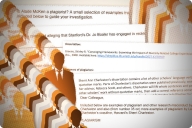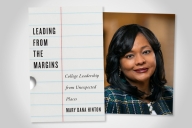You have /5 articles left.
Sign up for a free account or log in.
In the era of artificial intelligence, robots and more, higher education is arguably more important than ever. Academic researchers are producing the ideas that lead to technology after technology. On the other hand, a challenge exists for higher education: how to produce graduates whose careers won't be derailed by all of these advances. Now that robots can pick stocks, this isn't just about factory jobs, but the positions that college graduates have long assumed were theirs.
Northeastern University is involved in both sides of that equation. Its academic programs in engineering, computer science and other fields are producing these breakthroughs. And its students -- at an institution known for close ties to employers -- of course want good careers. Joseph E. Aoun, Northeastern's president, explores these issues in Robot-Proof: Higher Education in the Age of Artificial Intelligence (MIT Press). Aoun is a scholar in linguistics when he's not focused on university administration. His book argues that changes in the college curriculum are needed to prepare students in this new era, but that doesn't mean ignoring the humanities or general education.
Aoun, one of seven presidents honored today by the Carnegie Corporation for academic leadership, responded via email to questions about his new book.
Q: How worried should college graduates be about being replaced by technology? Is it likely that many jobs today held by those with college degrees will be replaced by robots or some form of technology?
A: Smart machines are getting smarter, and many of the jobs performed by people today are going to disappear. Some studies predict that half of all U.S. jobs are at risk within the next 20 years. And it’s not just blue-collar jobs; today intelligent machines are picking stocks, doing legal research and even writing news articles. Simply put, if a job can be automated in the future, it will be.
For higher education to meet this challenge -- for us to make people robot-proof -- we need to change. In my book, I offer a blueprint for how we can accomplish this. We will need to re-envision the curriculum, invest in experiential education and put lifelong learning at the heart of what we do. It will not be easy, but we have a responsibility -- to the students of today and tomorrow -- to change the way we do business.
Q: In an era of adaptive learning and online learning, should faculty members be worried about their jobs in the future?
A: We’re seeing educational content become commoditized. Therefore, the job of faculty members has to go beyond simply transmitting knowledge. More than ever, the priority for faculty is to create new knowledge and act as the catalysts to make their students robot-proof. The personal connection between student and teacher cannot be replaced by a machine.
But, like students, faculty members must act to meet the challenge of today’s world and should embrace the transformation of higher education that I describe in my book.
Q: What is “humanics,” and what are the three kinds of literacy that you want colleges to teach?
A: Humanics is the curriculum for a robot-proof education. It is based on the purposeful integration of technical literacies, such as coding and data analytics, with uniquely human literacies, such as creativity, entrepreneurship, ethics, cultural agility and the ability to work with others.
The key is integration. We need to break down the academic silos that separate historians from engineers.
When I talk to employers, they tell me that they would give their right arm for more systems thinkers -- quarterbacks who can see across disciplines and analyze them in an integrated way. And every student should be culturally agile, able to communicate across boundaries, and to think ethically. By integrating technology, data and humanities, we can help students become robot-proof.
Q: In your vision for the future of higher education, is this about embedding these skills into existing programs or starting from scratch?
A: Higher education has the elements for a robot-proof model, but we need to be much more intentional about how we integrate them. As I’ve mentioned, our curriculum needs to change so that technical and human literacies are unified.
We need to deliver this curriculum in an experiential way. This means recognizing that learning happens beyond the classroom through co-ops and meaningful internships. I truly believe that experiential education is the most powerful way to learn.
Still, no one is going to be set for life. We need to commit to lifelong learning in a way that we haven’t done in the past. Universities have been engaged in lifelong learning for many years, but it is usually treated as a second-class operation. We need to bring lifelong learning to the core of our mission.
This will require us to rethink the way we deliver education, particularly to working professionals who don’t have time to be on campus every day. Online and hybrid delivery modes will be essential. We have to meet learners wherever they are -- in their careers and around the world.
Credentials will need to be unbundled so that learners don’t have to commit to long-term degree programs. Stackable certificates, badges and boot camps will become the norm.
These changes won’t happen by themselves. Institutions should establish authentic partnerships with employers, redesign courses to fill gaps that employers actually need and connect them with students through co-ops and internships.
Q: How is Northeastern getting ready for these changes?
A: Northeastern has designed its academic plan to meet the challenges -- and opportunities -- presented by smart machines. Beyond the curricular changes required by humanics, and our leadership in experiential learning, we are building a multicampus network spanning different cities, regions and countries. Learners will be able to gain access to this network wherever they are and whenever it’s convenient for them.
Throughout its history, higher education has adapted to changes in the world. Knowing what we know about the revolution of smart machines, we have a responsibility to remain relevant and an opportunity to make our learners robot-proof.








